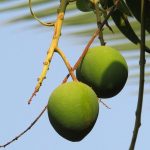As I embarked on my personal weight loss journey, I stumbled upon the intriguing African mango, a natural supplement that promised to support my goals. Intrigued, I decided to delve into the world of this exotic fruit.
African mango, scientifically known as Irvingia gabonensis, is a tree native to West Africa. Its seeds, which are used for medicinal purposes, are rich in a compound called polyphenols, which have antioxidant and anti-inflammatory properties. Studies have suggested that African mango may play a role in weight loss, blood sugar management, and cholesterol reduction.
One of the most promising features of African mango is its appetite-suppressing effects. The fiber content in the seeds helps to promote a feeling of fullness, reducing cravings and overeating. Additionally, the polyphenols may inhibit the absorption of fat in the intestines, further aiding in weight loss.
Research on African mango's blood sugar-regulating properties has also shown promise. The seeds contain compounds that may improve insulin sensitivity, allowing the body to use sugar more effectively. This can help prevent spikes in blood sugar levels, reducing the risk of developing type 2 diabetes.
Furthermore, African mango has been linked to cholesterol reduction. The seeds contain phytosterols, which are plant compounds that resemble cholesterol. When consumed, phytosterols compete with cholesterol for absorption in the intestines, reducing the amount of cholesterol that enters the bloodstream.
In addition to its weight loss and metabolic benefits, African mango may also boast antioxidant and anti-inflammatory properties. Polyphenols, the same compounds responsible for its appetite-suppressing effects, have antioxidant properties that can protect cells from damage caused by free radicals. The anti-inflammatory properties of African mango may also reduce the risk of chronic diseases such as heart disease and arthritis.
To incorporate African mango into my weight loss regimen, I opted for a dietary supplement containing the seed extract. I followed the recommended dosage and noticed a gradual decrease in my appetite and cravings. While I did not experience dramatic weight loss overnight, the supplement seemed to support my efforts and contribute to my overall weight loss journey.
It is important to note that African mango is not a miracle cure for weight loss. It should be used as part of a balanced diet and exercise program. Additionally, some people may experience side effects such as gas, bloating, or diarrhea. However, these side effects are generally mild and subside with continued use.
If you are considering using African mango for weight loss or other health benefits, it is crucial to consult with your healthcare provider. They can provide personalized advice and ensure that African mango is a suitable option for your individual needs.

